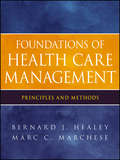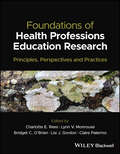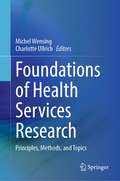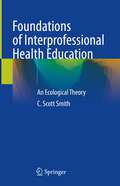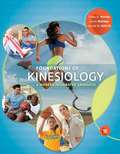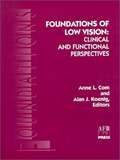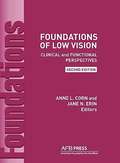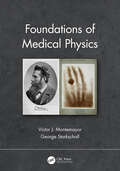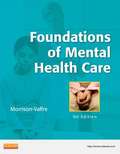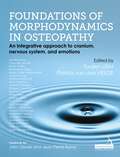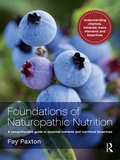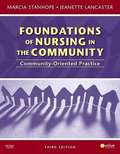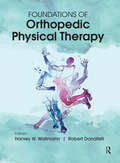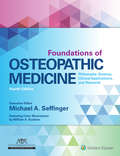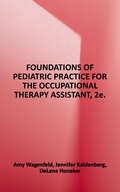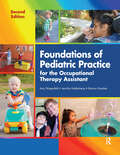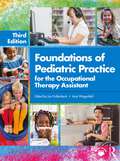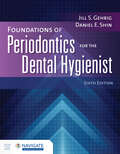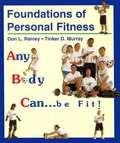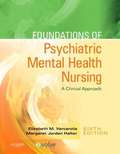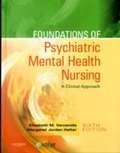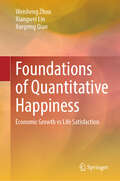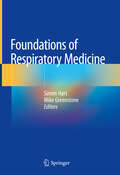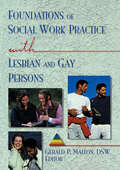- Table View
- List View
Foundations of Health Care Management
by Bernard J. Healey Marc C. MarcheseFoundations of Health Care Management Leaders and managers throughout the health care system are facing ever more challenging changes in the way care is delivered, paid for, and evaluated. Foundations of Health Care Management: Principles and Methods offers an innovative, concise, reader-friendly introduction to health care management and administration. It addresses the need for new skills in managers of health care facilities and for those planning to enter health care management positions. The book covers such critical topics as leadership training, change management, conflict management techniques, culture building, quality improvement, and communications skills, as well as collaboration in the improvement of population health. Foundations of Health Care Management also concentrates on innovations and describes steps in the transition to more decentralized and creative approaches to the management of health care facilities. The book covers physician management from the physician's viewpoint, a valuable perspective for health care managers. The book serves important dual purposes for faculty and students by providing both insights into the health care field as well as foundational content on essential management and leadership competencies. A full set of support materials is available for instructors at the book's companion Web site.
Foundations of Health Professions Education Research: Principles, Perspectives and Practices
by Charlotte E. Rees Lynn V. Monrouxe Bridget C. O’Brien Lisi J. Gordon Claire PalermoFoundations of Health Professions Education Research Understand the principles, perspectives, and practices for researching health professions education with this accessible introduction Educating healthcare students and professionals is critical to the long-term improvement of human health. Health professions education research (HPER) is a growing field with enormous potential to enrich the education of medical, nursing, and allied health students and professionals. There is still, however, an urgent need for a textbook focusing on the foundations of HPER that will help new and existing HPE researchers ground their work in research philosophies, evidence-based methodologies, and proven best practices. Foundations of Health Professions Education Research meets this need with a broad-based and accessible introduction to the foundations of HPER. Rooted in the latest theoretical and methodological advances, this book takes a global and interdisciplinary approach, designed to provide the widest possible range of backgrounds with a working knowledge of HPER. It promises to become an indispensable contribution to this growing field of increasingly rigorous research. Foundations of Health Professions Education Research readers will also find: An authorial team with decades of combined HPER experience on multiple continents Educational features such as learning outcomes, illustrative case studies, discussion points, and exercises to facilitate understanding and retention Detailed discussion of different approaches to HPER including scientific, realist, interpretivist, critical, and pragmatic approaches alongside a range of topics taking you through your entire research journey Foundations of Health Professions Education Research is a useful reference for both new and experienced HPE researchers, including postgraduate students studying HPER.
Foundations of Health Services Research: Principles, Methods, and Topics
by Michel Wensing Charlotte UllrichThis textbook provides a comprehensive introduction to health services research. Health services research uses empirical studies to address challenges in the delivery and organization of health care. The book focuses on healthcare delivery (micro-level), which is embedded in institutions such as hospitals (meso-level) and healthcare systems (macro-level). The quality of the research approach determines the value of health services research to a large extent. The book, therefore, puts emphasis on research principles and research methods. The book provides an evidence-informed perspective on principles, methods and topics of health services research and uses examples of studies throughout the text. The 24 chapters are organised in four sections: Introduction to Health Services Research Principles of Health Services Research Research Methods in Health Services Research Emerging Topics in Health Services Research Foundations of Health Services Research: Principles, Methods, and Topics gives an overview of tools and strategies for learning and teaching at master and doctoral levels. It also is a useful resource for health researchers in clinical science and public health. Policy-makers and healthcare managers might also find the book helpful for their work.
Foundations of Healthcare Ethics
by Jānis T. Ozoliņš Joanne GraingerIn order to provide the highest level of care to patients and clients, health professionals need a sound knowledge and understanding of healthcare ethics. Foundations of Healthcare Ethics: theory to practice focuses on the philosophical concepts underpinning contemporary ethical discourse for health professionals, and arms both students and professionals with the knowledge to tackle situations of moral uncertainty in clinical practice. Specially written to provide an in-depth study into the theoretical foundations of healthcare ethics, it covers a range of normative ethical theories, from virtue ethics to utilitarianism, while also investigating their application to contemporary issues in health care and society. It provides opportunities for self-directed learning, and presents questions and case studies to facilitate engagement and discussion. Foundations of Healthcare Ethics provides both students and professionals with an understanding of the philosophy governing healthcare ethics in order to help provide a better level of care to all patients and clients.
Foundations of Interprofessional Health Education: An Ecological Theory
by C. Scott SmithThis book is designed to introduce a theory of ecological psychology into interprofessional health education. The foundations are affordances (features in the environment that afford the opportunity to be recognized and utilized), the life-world (what the meaningful environment contains for the trainee), and behavioral-settings (person-made affordances that are permissive, supportive, or resistive to specific behaviors). Expanding the life-world is the main mechanism of learning in health care. Becoming aware of intentional and unintentional features of the behavioral setting is how we structure the curricular environment to achieve this life-world expansion. The book is structured into four domains: The Natural Domain, The Mental Domain, The Social Domain, and Non-Linearity. The final application section lays out a structure for designing, implementing, and evaluating the educational program in a professional healthcare setting. This book is ideal for clinician managers of interprofessional healthcare clinics, and for the teachers and trainees from each discipline (e.g., medicine, nursing, pharmacy, psychology, social work, etc.).
Foundations of Kinesiology: A Modern Integrated Approach
by Tinker D. Murray James A. Eldridge Harold W. KohlFoundations of Kinesiology: A Modern Integrated Approach helps you to explore your career options and sharpen your professional skills. The text focuses on physical activity as the center of the Kinesiology universe. It emphasizes the evolving and ever-changing career opportunities available working with individuals and populations across the lifespan--children, adolescents, adults and older adults--and in a variety of settings, including work, leisure, transportation, home, schools, sport, fitness facilities and rehabilitation centers. It equips you with a solid foundation in basic Kinesiology and helps you develop the skills you need for a career in personal training, occupational and physical therapy, athletic training, sports psychology or sports management.
Foundations of Low Vision: Clinical and Functional Perspectives
by Alan J. Koenig Anne L. CornThis text explains in great detail how to do low vision exams, the principles behind magnifiers and other forms of magnification, and much more.
Foundations of Low Vision: Clinical and Functional Perspectives (2nd Edition)
by Jane N. Erin Anne CornThe editors and contributors of this book provide an examination of the clinical and functional perspectives of low vision. New to the second edition are revisions in all areas, state-of-the-art technology, a reorganization to examine in more depth the needs of individuals in different age ranges, new charts, certification requirements for low vision therapists, and information on pathology, early development, and discussion of the relationship between the vision and the brain.
Foundations of Medical Physics
by George Starkschall Victor J. MontemayorCovering topics in Radiobiology, Modern Physics, Medical Imaging and Radiation Therapy, Foundations of Medical Physics serves as an introduction to the field of Medical Physics, or Radiation Oncology Physics.An overview of the history of cancer and cancer treatment along with a brief introduction to the fundamental principles of Radiobiology constitute Part I of this book, which serves as the motivation for the principles of Radiation Therapy, or cancer treatment with radiation. Part II contains the fundamental ideas from Modern Physics that form the foundation for an understanding of the approaches to treatment used in Radiation Therapy. Finally, Part III shows the applications of Parts I and II to Medical Imaging and Radiation Therapy. This unusual introduction to Medical Physics is aimed at undergraduate physics majors along with other science majors who have taken at least one year of Physics and one year of calculus, although Medical Physics graduate students and radiation oncology residents may find this different approach to the subject illuminating. This text assumes that the instructor is a physicist who does not necessarily have a background in Medical Physics.
Foundations of Mental Health Care
by Michelle Morrison-ValfreIncrease your awareness and understanding of a holistic view of mental health care with this book for nurses and other health care professionals. Each chapter covers a specific psychological or psychosocial problem as well as the most current interventions and treatments. This edition features full-color illustrations, updated drug information, and a chapter on complementary and alternative therapies, in addition to more case studies to help you apply the content to real life. This solid background in mental health is just what you need to work comfortably with clients who exhibit both effective and maladaptive behaviors.
Foundations of Morphodynamics in Osteopathy: An Integrative Approach to Cranium, Nervous System, and Emotions
by Torsten Liem Patrick van HeedeIn 35 chapters written by the editors and a team of internationally renowned contributors, the book covers the underlying principles of osteopathic palpation from a biodynamic and 'morphodynamic' perspective, and their application in the cranial field and the spinal cord.It emphasises the importance of considering not just the patient's physical self, but also the inner consciousness. It teaches how to assess tissue-energy characteristics, and to use this understanding in managing the whole patient.The work discusses biophysical, neurobiological and psychological interactions as well as the interplay of developmental dynamics and further epigenetic influences on the organism.As well as the primary respiratory mechanism, various biological rhythms play an important role within osteopathic treatment; the book explores new insights that flow from chronobiology and rhythm research.All osteopathic practice develops on conceptual foundations. Acknowledging the importance in the practice of osteopathy of such theoretical underpinning, the book discusses osteopathy with regard to the development of paradigms within the healing arts as well as from various philosophical viewpoints - such as postmodern, system-theoretical, Goethian and phenomenological. It examines thoroughly the multi-layered dynamics of development of human beings interacting with their environment.The resulting implications for therapeutic interaction as well as principles of diagnosis and treatment form the core of the book. These fundamental principles are then specifically applied to the cranial sphere. This section focuses primarily on the treatment of the brain, as well as the developmental dynamics of the relations of the midline, cranial bones, dural structures, vessels and cranial nerves.
Foundations of Naturopathic Nutrition: A comprehensive guide to essential nutrients and nutritional bioactives
by Fay PaxtonNutrition is a vital part of the complementary approach to health. This uniquely comprehensive and evidence-based text provides a detailed and systematic guide to the principles of clinical nutrition from a naturopathic perspective.The text begins with an overview of basic physiological principles and the body's protective systems, such as the antioxidant, detoxification and immune systems. The focus then moves to an in-depth examination of food components, including essential nutrients, such as protein, lipids, carbohydrates, vitamins, minerals and trace elements, as well as nutritional bioactives, such as coenzyme Q10, alpha-lipoic acid, phytochemicals, digestive enzymes and probiotics. There is detailed information on how each food component is digested and metabolised in the body, and guidance on its impact on health, including an explanation of the effects of inadequate and excessive intake. The types of supplements available together with dietary sources are also explored.Discussions of important nutritional topics are featured - for example, water as therapy, obesity, anorexia nervosa, high-protein diets, hypoglycaemia, diabetes, phytosterols, gamma-tocopherol, vitamin E and mortality, vitamin C and cancer, infantile scurvy, acid-forming and alkaline-forming diets, hair analysis, sodium and blood pressure, and coenzyme Q10 and cancer. Summary boxes, case studies and quizzes will help readers consolidate their knowledge.Foundations of Naturopathic Nutrition is an essential reference for everyone studying nutrition from a complementary health perspective.'I thoroughly recommend this book as a learning aid for students, and as an excellent reference guide for experienced practitioners.' - Jackie Day, President, Naturopathic Nutrition Association (UK)'A fabulous resource, not only for practitioners but also all those with an interest in nutrition.' - Professor Alan Bensoussan, Director, National Institute of Complementary Medicine, University of Western Sydney'The foundation nutrition text we've all been waiting for. Fay Paxton has drawn from her many years of clinical nutrition experience, combining it with relevant research-based evidence, to produce an exhaustive body of work that is unique in its specific relevance to naturopathic and complementary medicine students and practitioners.' - David Stelfox, Associate Program Leader, Naturopathy, Endeavour College of Natural Health
Foundations of Nursing in the Community: Community-Oriented Practice
by Marcia Stanhope Jeanette LancasterWith concise, focused coverage of nursing in the community, this easy-to-read textbook provides the essential information you need to know for clinical practice - from nursing roles and care settings to vulnerable population groups. It features a practical, community-oriented approach, with an emphasis on health promotion and disease prevention.Separate chapters on the various roles and settings for community health nursing, including faith community nurse, home health nurse, school nurse, occupational health nurse, and governmental public health roles, provides a comprehensive perspective on these fields. A detailed discussion of vulnerable populations presents theoretical, assessment, and intervention concepts to help you understand the unique issues of this group. Coverage of specific vulnerable populations includes clients in rural settings, migrant workers, pregnant teens, the homeless, those with substance abuse problems, and clients with mental illness. What Would You Do? activities strengthen your problem-solving skills and challenge you to apply chapter material outside the classroom. Case studies illustrate how key textbook concepts can be applied to real-world community nursing situations. Level of Prevention boxes identify specific interventions for primary, secondary, and tertiary levels of prevention and emphasize the importance of a preventive approach in community-oriented nursing. Evidence-Based Practice boxes focus on recent research findings and how they can be applied to community nursing practice. Healthy People 2010 boxes discuss how national public health efforts impact community health practice. Practice Applications present real-life community client situations followed by questions and answers. A new chapter on surveillance and outbreak investigation explores the importance of collection, analysis, and interpretation of health data to maintain public health and resolve problems in communicable/infectious diseases, chronic diseases, and terroristic events. A combined health education and group practice chapter discusses community- and population-level education within the context of families, groups, and communities. Enhanced coverage of the Minnesota Intervention Wheel introduces you to this public health nursing model and further explains the wheel and its components.
Foundations of Orthopedic Physical Therapy
by Robert Donatelli Harvey WallmannA tool for students, educators, and clinicians, Foundations of Orthopedic Physical Therapy contains the latest literature in orthopedic physical therapy and guides readers through all elements of orthopedic assessment and treatment. Drs. Harvey Wallmann and Robert Donatelli offer a contemporary, evidence-based approach, working to address the topics that influence clinical decisions when developing rehabilitation and exercise programs. The text is consistent with the concepts and terminology presented in the APTA Guide to Physical Therapist Practice 3.0 and reviews the clinical practice guidelines for different conditions and body regions with an explanation of different levels of evidence.Foundations of Orthopedic Physical Therapy emphasizes a comprehensive method to assessment that produces treatment guidelines instead of rigid protocols and incorporates basic principles of evaluation, examination, and clinical reasoning. Each chapter contains author comments focusing on their perception of an effective patient intervention, evidence-based support for their decisions, and illustrative client case studies featuring unique and diverse patients who require specific interventions related to their orthopedic issues. Five main areas are addressed: • Foundations of orthopedic rehabilitation • Upper extremity • Lower extremity • Spinal column • Special topics in orthopedic rehabilitation Foundations of Orthopedic Physical Therapy is the perfect guide for students intending to work with the orthopedic population in the treatment and intervention of injuries, pathologies, and disorders, or practicing physical therapists who want to expand their knowledge.
Foundations of Osteopathic Medicine: Philosophy, Science, Clinical Applications, and Research
by Michael SeffingerPublisher's Note: Products purchased from 3rd Party sellers are not guaranteed by the Publisher for quality, authenticity, or access to any online entitlements included with the product. The most current, comprehensive osteopathic text available, Foundations of Osteopathic Medicine, Fourth Edition, defines osteopathic terminology and techniques and instills the confident understanding essential to clinical success. This proven resource is the standard text for teaching the osteopathic profession, providing broad, multidisciplinary coverage of osteopathic considerations in the basic sciences, behavioral sciences, family practice and primary care, and the clinical specialties. Endorsed by the American Osteopathic Association, this popular text makes the key tenets of osteopathic practice more accessible than ever and demonstrates a wide variety of osteopathic manipulative methods in vivid detail. More than half of this new edition is made up of all-new content, reflecting current practices in basic sciences foundation, the osteopathic approach to patient care, somatic dysfunction and treatment, osteopathic considerations in the specialties, and research investigating osteopathic principles. New illustrations and a full-color design bring concepts to life, and enhanced pedagogical features make the entire text easier to use for students and practitioners alike.
Foundations of Pediatric Practice for the Occupational Therapy Assistant
by Amy Wagenfeld Jennifer Kaldenberg DeLana HonakerFoundations of Pediatric Practice for the Occupational Therapy Assistant, Second Edition delivers essential information for occupational therapy assistant students and practitioners in a succinct and straightforward format. In collaboration with a wide range of highly skilled and expert professionals from clinical practice and academia, Amy Wagenfeld, Jennifer Kaldenberg, and DeLana Honaker present an interprofessional perspective on pediatric clinical foundations, theory, and practical application activities in a highly accessible and engaging format. The Second Edition of Foundations of Pediatric Practice for the Occupational Therapy Assistant offers new and engaging features, including diverse illustrations, to facilitate learning from the classroom to the clinic. Integrated within each chapter are Stories From Practice: brief vignettes of actual author clinical experiences, short case studies, and reflective activities designed to elicit discussion and exploration into the unique world of pediatric occupational therapy theory and practice. A new chapter on childhood trauma has been added to enhance the comprehensive and current nature of pediatric practice in the 21st century. Available online is a significant Major Infant Reflexes Chart and a comprehensive Normal Developmental Milestones Chart that will reinforce important concepts associated with child development as it relates to occupational therapy assistant practice. The seamless integration of this material enables all readers to develop a comprehensive understanding of the information and apply that knowledge in a pediatric setting. Features of the Second Edition: - Up-to-date information, including the AOTA's current Occupational TherapyCode of Ethics - Stories From Practice feature, which provides a unique reflective link from classroom to clinic - Useful resources for classroom to clinical practice - Bonus website that provides a comprehensive Normal Developmental Milestones Chart and Major Infants Reflexes Chart - Chapter on childhood trauma Instructors in educational settings can visit www.efacultylounge.com for additional material to be used for teaching in the classroom. Foundations of Pediatric Practice for the Occupational Therapy Assistant, Second Edition continues to be the perfect text for both occupational therapy assistant students and practitioners specializing in or transitioning to pediatrics.
Foundations of Pediatric Practice for the Occupational Therapy Assistant
by Amy Wagenfeld Jennifer Kaldenberg DeLana HonakerFoundations of Pediatric Practice for the Occupational Therapy Assistant, Second Edition delivers essential information for occupational therapy assistant students and practitioners in a succinct and straightforward format. In collaboration with a wide range of highly skilled and expert professionals from clinical practice and academia, Amy Wagenfeld, Jennifer Kaldenberg, and DeLana Honaker present an interprofessional perspective to pediatric clinical foundations, theory, and practical application activities in a highly accessible and engaging format.The Second Edition of Foundations of Pediatric Practice for the Occupational Therapy Assistant offers new and engaging features, including diverse illustrations, to facilitate learning from the classroom to the clinic. Integrated within each chapter are Stories From Practice: brief vignettes of actual author clinical experiences, short case studies, and reflective activities designed to elicit discussion and exploration into the unique world of pediatric occupational therapy theory and practice. A new chapter on childhood trauma has been added to enhance the comprehensive and current nature of pediatric practice in the 21st century.Available online is a significant Major Infant Reflexes Chart and a comprehensive Normal Developmental Milestones Chart that will reinforce important concepts associated with child development as it relates to occupational therapy assistant practice. The seamless integration of this material enables all readers to develop a comprehensive understanding of the information and apply that knowledge in a pediatric setting.Features of the Second Edition: Up-to-date information, including the AOTA’s current Occupational TherapyCode of Ethics Stories From Practice feature, which provides a unique reflective link from classroom to clinic Useful resources for classroom to clinical practice Bonus website that provides a comprehensive Normal Developmental Milestones Chart and Major Infants Reflexes Chart Chapter on childhood trauma Included with the text are online supplemental materials for faculty use in the classroom. Foundations of Pediatric Practice for the Occupational Therapy Assistant, Second Edition continues to be the perfect text for both occupational therapy assistant students and practitioners specializing in or transitioning to pediatrics.
Foundations of Pediatric Practice for the Occupational Therapy Assistant
by Amy Wagenfeld Jan HollenbeckThis best-selling text provides an essential introduction to the theoretical foundations to clinical pediatric care within occupational therapy, as well as illustrative guidance to inform its practical application for occupational therapy assistants.This new edition has been thoroughly updated to include new chapters on autism and trauma responsive care, and with a greater overall emphasis on occupational performance and participation. The book aligns with the fourth edition of the OT Practice Framework, as well as the AOTA 2020 Code of Ethics. Written in a succinct and straightforward style throughout, each chapter features brief vignettes drawn on the authors' own clinical experiences, case studies, and reflective activities designed to elicit discussion and exploration into the unique world of pediatric occupational therapy theory and practice. This edition also includes a new feature, ‘In My Words’, charting the experiences of caregivers and children themselves.Including chapters from some of the leading practitioners in the field, and featuring color photos throughout, this will be a key resource for any occupational therapy assistant student or practitioner working with children and their caregivers.
Foundations of Periodontics for the Dental Hygienist with Navigate Advantage Access
by Jill S. Gehrig Daniel E. ShinWith a comprehensive and student-friendly format, Foundations of Periodontics for the Dental Hygienist, Sixth Edition equips dental hygiene students with modern, evidence-based coverage of periodontal anatomy, the periodontal disease process, and classification of periodontal disease. Using an easy-to-follow, detailed outline format, leading experts in the field provide readers with an accessible account of the complex subject of periodontics. Rich with engaging features and student resources, the Sixth Edition has been revised and updated throughout to reflect the hygienist's increasingly important role in periodontal therapy, while detailing how students can confidently apply what they have learned to clinical patient care.
Foundations of Personal Fitness: Any Body Can... Be Fit!
by Don L. Rainey Tinker D. MurrayThe book discusses the foundations of physical fitness, the benefits of regular exercise, and the advantages of weight training and proper nutrition.
Foundations of Psychiatric Mental Health Nursing: A Clinical Approach
by Elizabeth Varcarolis Margaret HalterThe 6th edition of this market-leading textbook offers a clear, straightforward way to understand the often intimidating subject of psychiatric mental health nursing. Its practical, clinical perspective and user-friendly writing style help you quickly master key concepts. Clinical chapters follow the nursing process framework and progress from theory to application with a wealth of real-world examples to prepare you for practice.UNIQUE! A conversational, user-friendly writing style helps you quickly grasp complex psychiatric mental health nursing concepts. Clinical chapters are logically and consistently organized with sections on the clinical picture, epidemiology, comorbidity, etiology, and application of the nursing process. Clinical chapters follow the nursing process, providing you with consistent guidelines for comprehensive assessment and intervention. Vignettes prepare you for real-world practice with personal, descriptive characterizations of patients with specific psychiatric disorders. Coverage of psychopharmacology in clinical chapters familiarizes you with specific drug treatment options, including the most commonly used drugs and important nursing considerations for their use. Assessment Guidelines boxes list essential guidelines for comprehensive patient assessment. Case Studies with Nursing Care Plans present individualized histories of patients with specific psychiatric disorders and include interventions with rationales and evaluation statements for each patient goal. A separate chapter on cultural implications, as well as Considering Culture boxes throughout the text, provides essential information on culture, worldviews, and techniques for providing culturally competent care. Coverage of treatment and recovery in the community addresses the need for successful ongoing psychiatric mental health nursing care in the community setting. A chapter on end-of-life care examines the psychological impact of terminal illness and death on patients, families, and nurses.Updated nursing process and clinical chapters keep you current with the latest ANA Psychiatric-Mental Health Nursing: Scope and Standards of Practice. An increased focus on health promotion and recovery reflects federal, state, and local initiatives to improve screening methods, patient and family teaching, rehabilitation, and community treatment options for people who have mental illnesses. Enhanced Evidence-Based Practice boxes emphasize the profound impact of research-and your potential role in that process-on the advancement of psychiatric treatment options. A new chapter on sleep disorders covers the most common sleep disturbances and their relationships to psychiatric illness, as well as the nurse's role in their assessment and management. A new chapter on sexual dysfunction and sexual disorders examines the complex issue of sexual behavior and provides the information you need to conduct a sexual assessment, identify sexual dysfunctions and disorders, recognize nursing implications, and formulate interventions.
Foundations of Psychiatric Mental Health Nursing: A Clinical Approach (6th Edition)
by Elizabeth M. Varcarolis Margaret Jordan HalterThe 6th edition of this textbook offers a clear, straightforward way to understand the often intimidating subject of psychiatric mental health nursing. Its practical, clinical perspective and user-friendly writing style help you quickly master key concepts. Clinical chapters follow the nursing process framework and progress from theory to application with a wealth of real-world examples to prepare you for practice.
Foundations of Quantitative Happiness: Economic Growth vs Life Satisfaction
by Weisheng Zhou Xuepeng Qian Xiangwei LinThis book is a rarity in that it conducts a comparative study of life satisfaction between Japan and China over a wider area and time period, filling a gap in empirical research on life satisfaction. Unlike many other countries that have focused primarily on the pursuit of economic prosperity, this study objectively examines the relationship between economic growth and life satisfaction. This study examines various aspects of the proportion of individuals who report being satisfied with their lives, including time series and single-year comparisons, as well as the level and rate of economic growth. This study conducted independent questionnaire surveys in China and Japan, analyzed the impact of absolute income and relative income on life satisfaction, and then objectively examined and compared life satisfaction in China and Japan. Furthermore, this study proposes that real disposable income exceeding $8,000 is an important signal of a shift in the pursuit of "spiritual wealth" from an emphasis on "material wealth" among the Chinese and Japanese. In particular, questionnaire surveys, one for all of Japan and one specifically for Kyoto City, were conducted on the impact of the global pandemic COVID-19 on life satisfaction, and it was found that the original "US$8,000" line has risen to "US$15,000". This study not only enriches the understanding of the relationship between economic growth, COVID-19 and life satisfaction, but also provides a new perspective for policy making.
Foundations of Respiratory Medicine
by Simon Hart Mike GreenstoneThis book meets the need for a resource that covers the core knowledge required to pass the SCE exam, which includes the broad field of respiratory medicine. This book is also highly applicable to core medical trainees sitting their MRCP examinations. The format is ideal for effective exam revision with individual chapters covering the key points of each condition in sufficient (but not excessive) detail. Examples of imaging (CXR, CT, PET-CT) are utilised to illustrate cases and descriptions of modern respiratory intervention such as the EBUS/EUS-guided sampling and medical thoracoscopy is included in this essential exam resource.
Foundations of Social Work Practice with Lesbian and Gay Persons
by Gerald P MallonFocusing on the pragmatic aspects of social work with gay and lesbian persons, this book offers a knowledge base of practice that will better prepare students and practitioners for working more competently and effectively with lesbians and gay men. Written by scholars and practitioners in the social work profession, Foundations of Social Work Practice with Lesbian and Gay Persons teaches you how to develop practice approaches that are sensitive to issues of sexual orientation as well as how to work with this population in the contexts of practice with individuals, couples, families, groups, communities, and organizations. The book’s sensible strategies and case studies provide you with critical information that will help you deal with homophobia and heterocentrism and enact a professional commitment to pursuing economic and social equality for diverse and at-risk client populations.A foundation-level text on social work practice with gays and lesbians, this book is designed to provide social work students, academics, and practitioners with an understanding of the values and ethics fundamental to practice with this group of clients. Foundations of Social Work Practice with Lesbian and Gay Persons summarizes the variety of issues, dynamics, and techniques required to work effectively with gay and lesbian clients who are at different points in their development and life cycles. To further help you in your practice, it also discusses: providing skilled professional assistance to gay victims of hate crimes how homophobia can prevent lesbians and gay men from receiving adequate services the obstacles social workers sometimes face when trying to integrate the core set of professional values and ethical principles into their practice practitioner self-disclosure regarding sexual identity developmental milestones for lesbian and gay persons alcohol and substance abuse among lesbians family therapy concepts of fusion and enmeshment same gender socialization assessing issues of sexual expressionCounselors, social workers, and students and academics in gay and lesbian studies will find that Foundations of Social Work Practice with Lesbian and Gay Persons greatly expands the social work knowledge base to disrupt the impact of institutional, individualized, and internal homophobia on social workers, their clients, and the institutions in which social workers practice. Its flexible and creative treatment approaches to therapy with sexual minorities are sure to help you sensitize your therapeutic techniques and improve the quality of care you deliver.
